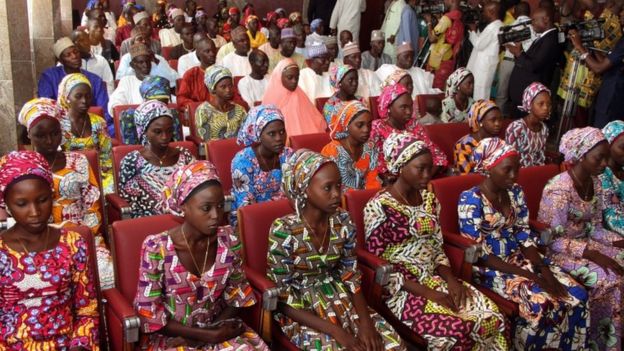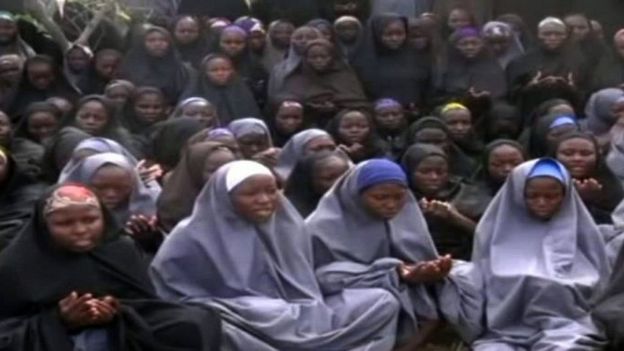Three years after their abduction, 82 girls out of 276 have been released by Islamist militants Boko Haram.
The ‘Chibok’ girls were taken from north-eastern Nigeria from their homes and their families, the popular hashtag ‘Free our girls’ arose as part of the worldwide social media campaign to get the girls back.

Image copyrightAFP
Twenty-one girls were released last October
The release reportedly came after talks with the government, though few details are confirmed.
Before the latest release, about 195 of the girls were still missing. Over 50 girls managed to escape Boko Haram back in April 2014 after the Government’s Secondary School in Chibok was raided. The militants then freed more girls following negotiations with the Red Cross in October 2016.
Sources have told the press that the girls are currently safe in the protection of the Nigerian army after being transported by road convoy to a remote army base near the Cameroon border.
The campaign for the return of the girls has drawn the support of then US First Lady Michelle Obama and many Hollywood stars. It has been an occurrence that touched many people all over the world.

Copyright DAILY MIRROR
Michelle Obama supports the cause advocating for the girls freedom
Last month, President Muhammadu Buhari said the government remained “in constant touch through negotiations, through local intelligence to secure the release of the remaining girls and other abducted persons unharmed”.
Many families in Chibok will be rejoicing at this latest news, but more than 100 of the girls taken have yet to be returned.
Christian pastor Enoch Mark, whose two daughters were among those kidnapped, told Agence France-Presse: “This is good news to us. We have been waiting for this day. We hope the remaining girls will soon be released.”
He doesn’t know yet if his daughters are among those freed.
 Image copyright GETTY AFPSome of the girls pictured in May 2014, shortly after their kidnapping
Image copyright GETTY AFPSome of the girls pictured in May 2014, shortly after their kidnapping
Many of the Chibok girls were Christian, but have since been encouraged to convert to Islam and to marry their kidnappers during their time in captivity. It is not clear what state the girls are in now that they’re released as the militants are known for their harsh treatment of prisoners.
Boko Haram has now kidnapped thousands of other people during its eight-year insurgency, aimed at creating an Islamic caliphate in north-eastern Nigeria.
More than 30,000 others have been killed, the government says, and hundreds of thousands have been forced to flee from their homes. It is not clear when their reign of terror will end but it is clear that continued pressure from the government and third-party organisations is appearing to have a positive effect, one which will hope will continue until all the girls are freed.